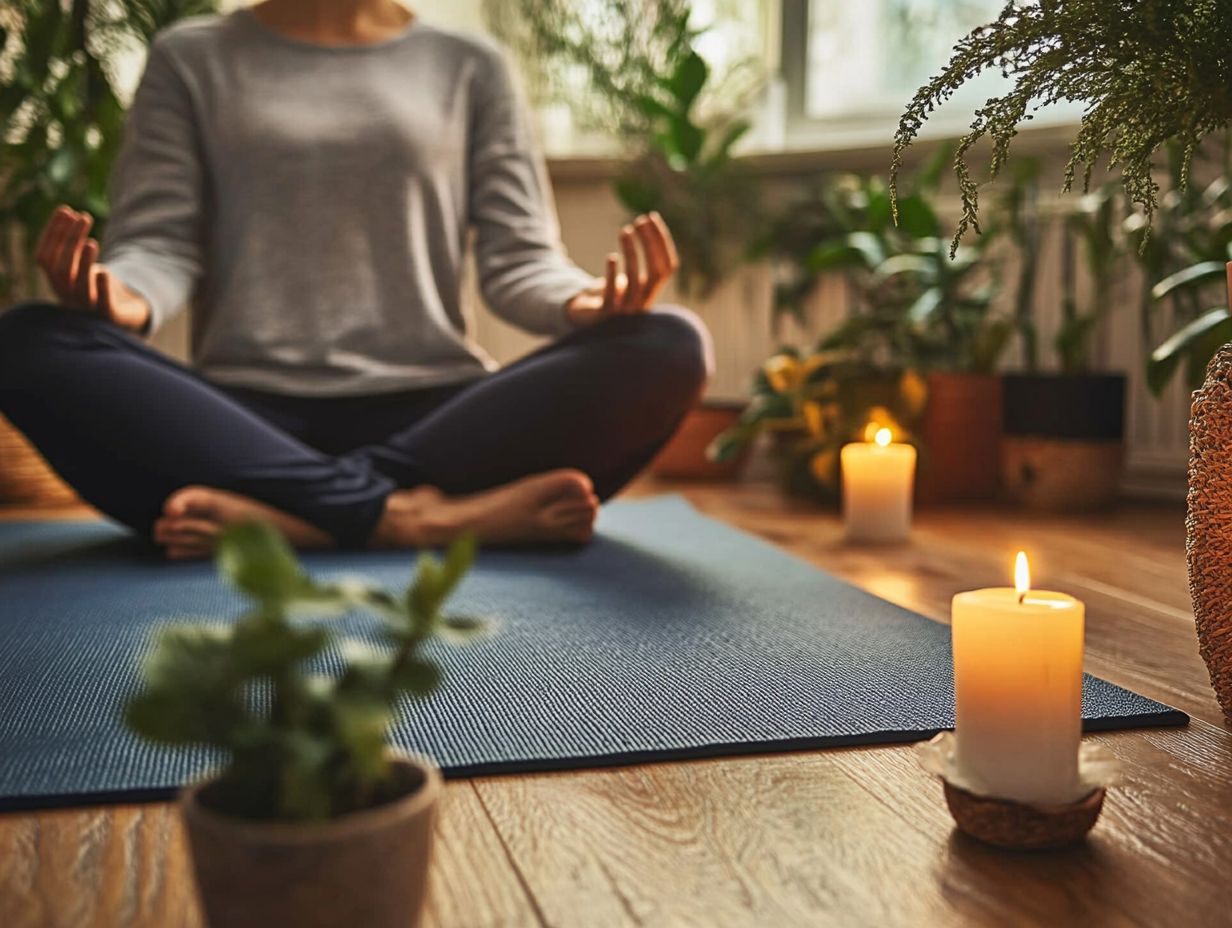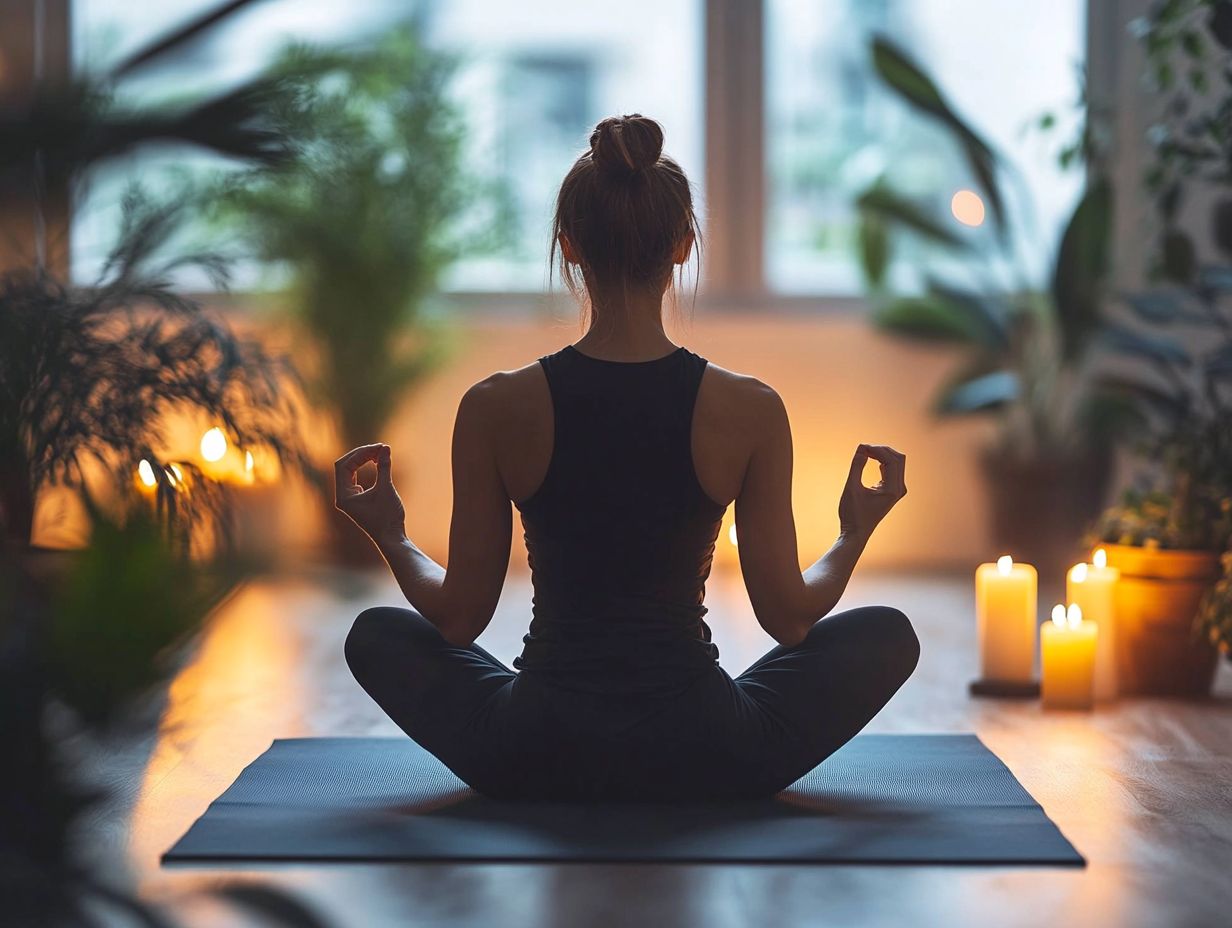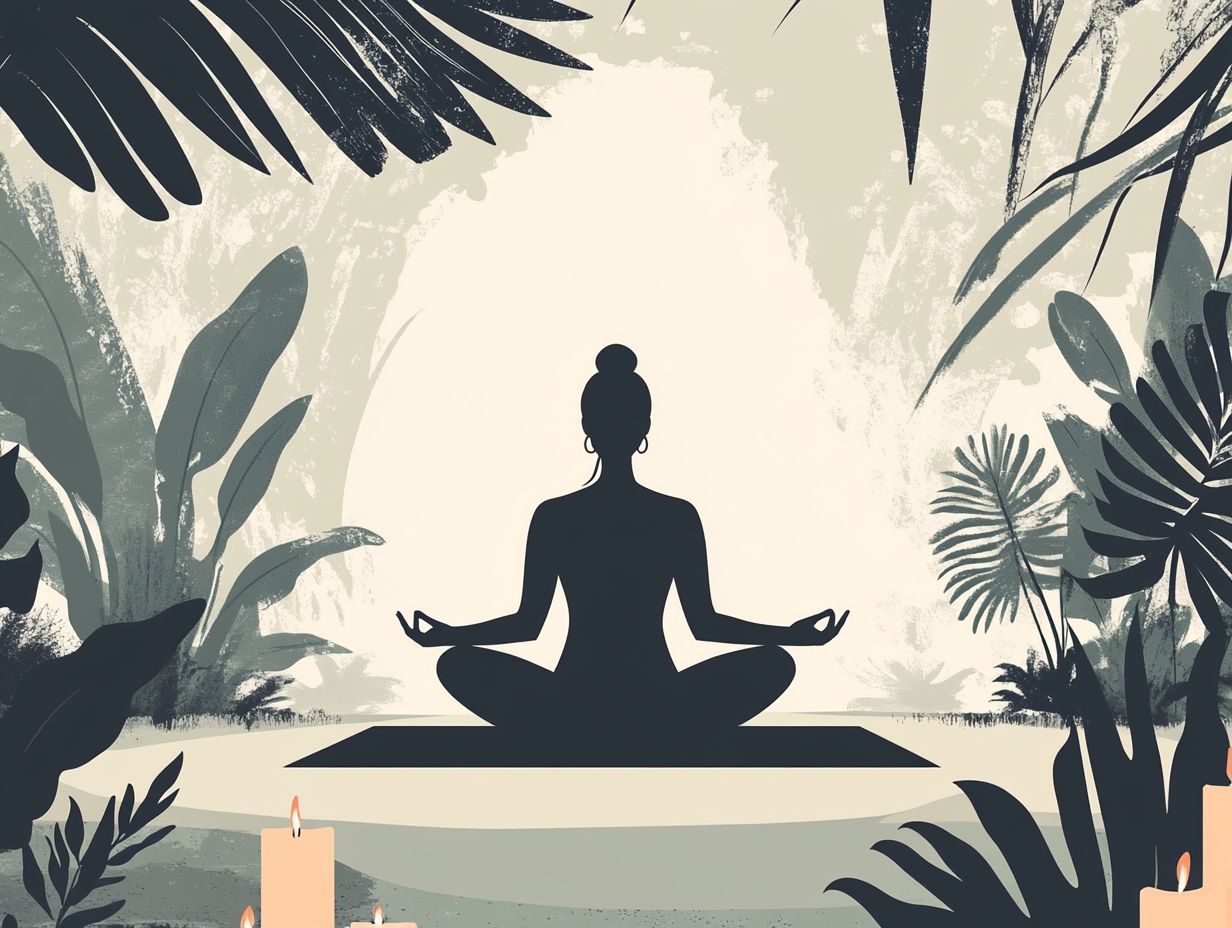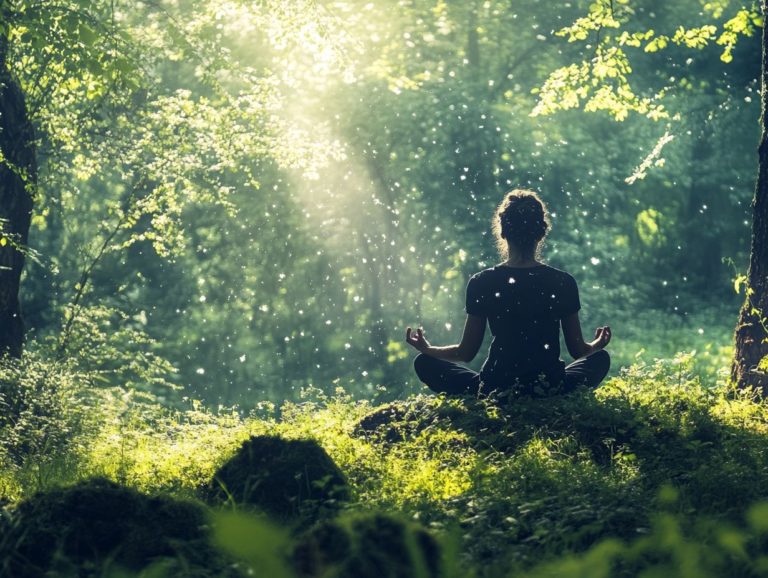Meditation Techniques for Beginners
Meditation has become an invaluable practice for enhancing your mental clarity and emotional well-being.
Are you feeling overwhelmed or just seeking calm? There’s a meditation technique for you.
Explore various meditation methods that can transform your life, from mindful breathing to loving-kindness meditation, all perfectly suited for beginners.
This article also offers insights on how to seamlessly incorporate these practices into your daily routine, addresses common challenges you may face, and highlights potential risks to be aware of.
Prepare yourself to embark on this transformative meditation journey!
Contents
- Key Takeaways:
- 1. Mindful Breathing
- 2. Body Scan Meditation
- 3. Mantra Meditation
- 4. Loving-Kindness Meditation
- 5. Transcendental Meditation
- 6. Walking Meditation
- 7. Visualization Meditation
- 8. Chanting Meditation
- 9. Yoga Meditation
- 10. Mindful Eating
- 11. Gratitude Meditation
- 12. Sound Meditation
- 13. Progressive Muscle Relaxation
- 14. Guided Meditation
- 15. Body Movement Meditation
- What Is Meditation and How Does It Benefit the Mind and Body?
- Frequently Asked Questions
Key Takeaways:

- Make meditation a daily habit for a happier, less stressed life while boosting your overall well-being.
- Experiment with different techniques, such as mindful breathing, body scan meditation, walking meditation, and loving-kindness meditation to find what works best for you.
- Be patient with yourself and overcome common challenges by staying consistent and seeking guidance from experienced practitioners.
1. Mindful Breathing
Mindful breathing serves as a cornerstone of mindfulness and meditation. This technique allows you to focus on your breath to cultivate mental clarity, reduce stress, and enhance your emotional well-being.
This practice invites you to pay attention to each inhale and exhale, letting your thoughts drift away and gently guiding your awareness back to the present moment. In doing so, you foster a deep sense of relaxation and self-awareness.
You may experience a profound transformation in your daily life. By incorporating techniques like breathing deeply using your diaphragm, 4-7-8 breathing, or box breathing, you can activate your body s relaxation response, promoting a serene state of mind.
Each of these techniques offers unique benefits, such as reducing anxiety, improving focus, and helping to regulate emotions.
Engaging in these practices regularly not only enhances your ability to manage stress but also cultivates resilience and emotional balance. This makes it easier for you to navigate life s challenges with grace and poise.
2. Body Scan Meditation
Body scan meditation is a transformative practice that invites you into a realm of deep relaxation and heightened body awareness. This technique enables you to connect with your physical sensations and emotional well-being on a profound level.
As you guide your attention through different parts of your body, you’ll uncover and release tension that may have been lingering unnoticed. Begin by finding a comfortable position, whether seated or lying down, creating an environment that fosters introspection.
Once settled, close your eyes and take a few deep breaths. This simple act helps ground your focus, allowing you to transition smoothly into the practice.
Next, methodically shift your attention from your toes to the crown of your head, tuning in to areas of tightness or discomfort. Regularly practicing this technique can greatly alleviate anxiety, nurturing a sense of calm and enhancing your emotional resilience. This way, you’ll find it easier to navigate the complexities of life with grace and ease.
3. Mantra Meditation
Mantra meditation is a powerful technique in which you repeat a specific word or phrase, enhancing your concentration and guiding you into a deeper state of mindfulness. This practice can lead to improved mental clarity and emotional balance.
As you focus on these sound vibrations, you ll effectively quiet the incessant chatter of your mind, ushering in a genuine sense of peace. Many practitioners select mantras that resonate with their intentions or spiritual beliefs perhaps ‘Om‘ for universal connection or ‘So Hum‘ for self-awareness.
This rhythmic repetition not only helps reduce stress but also cultivates a profound inner stillness. By integrating mantra meditation into your daily routine, you may discover heightened awareness, increased resilience when facing challenges, and a richer connection to your inner self.
4. Loving-Kindness Meditation
Loving-kindness meditation, also known as Metta Bhavana (a meditation that focuses on generating love and kindness), is a profound practice that helps you feel more caring and emotionally healthy by directing love and kindness toward yourself and others. This approach can lead to remarkable improvements in your mental health.
This transformative technique unfolds in a series of thoughtful steps:
- Start with self-reflection to cultivate feelings of warmth toward yourself.
- Gradually extend those feelings to loved ones, acquaintances, and even those challenging individuals in your life.
Research from experts like Richard J. Davidson, Ph.D. shows that engaging in this meditation not only reduces anxiety but also enhances empathy. This creates a ripple effect of kindness in your relationships. Practitioners frequently experience greater emotional resilience and improved social connections, reinforcing the notion that nurturing compassion within oneself can significantly enhance overall well-being.
5. Transcendental Meditation
Transcendental Meditation (TM) is an esteemed technique that invites you to experience profound relaxation and stress relief, unlocking a myriad of health benefits for your mental health and overall well-being.
Unlike other meditation practices that may dwell on mindfulness or breath control, TM focuses on the repetition of a specific mantra. This enables you to effortlessly settle into a state of restful awareness. Practice this technique for just twenty minutes, twice a day, and watch your stress melt away! For additional support, consider 5 relaxation techniques for college students. Research shows that it significantly lowers anxiety and enhances your emotional health.
Personal stories show how individuals have embraced TM amidst their hectic lives. They discover tranquility and clarity where chaos once reigned. Scientific studies back this up, revealing that regular TM practice can lead to lower blood pressure, reduced stress hormones, and improved cognitive function making it a formidable ally in navigating today s fast-paced world.
6. Walking Meditation
Walking meditation is a captivating mindfulness practice that seamlessly blends the benefits of movement with meditation. It invites you to cultivate body awareness and elevate your relaxation response. This mindful movement practice is a wonderful way to integrate meditation into your daily life.
You can embrace this unique form of meditation in various settings, whether you find yourself in a tranquil park, a peaceful room, or navigating a lively city street. Unlike traditional seated meditation, which champions stillness, walking meditation encourages you to engage dynamically with your surroundings.
As you focus on the rhythm of your steps and the sensations coursing through your body, you can forge a deeper connection to the present moment. This mindful movement not only supports your physical well-being but also profoundly influences your emotional health. It reduces stress and enhances your overall mood while fostering a sense of calm and clarity.
7. Visualization Meditation

Visualization meditation is an incredibly powerful technique that harnesses your imagination to craft vivid mental images. This practice not only promotes mental clarity and focus but also invites a profound state of relaxation.
If you’re striving to achieve specific goals, think of this technique as your personal mental rehearsal. Picture yourself successfully completing tasks whether it’s nailing that presentation or reaching a personal milestone. This method also plays a crucial role in enhancing emotional balance. By visualizing calming scenes or supportive environments, you can effectively diminish feelings of anxiety.
Consider a simple visualization exercise: imagine yourself on a tranquil beach during meditation, where the gentle sound of waves washes over you, instilling a sense of peace. Alternatively, envision yourself enveloped in a warm, protective light. This image can nurture feelings of security and comfort, especially during those stressful moments.
8. Chanting Meditation
Chanting meditation invites you to immerse yourself in the repetition of sounds or phrases. This practice creates a meditative state that enhances mindfulness and nurtures emotional well-being through the transformative power of sound.
This method has deep roots across various cultures, featuring distinct forms like Gregorian chants, Buddhist mantras, and the rhythmic singing of Native American tribes. Each form embodies the unique spiritual beliefs and communal bonds of its origin. Engaging in these diverse chants allows you to connect deeply with your heritage while also providing an emotional release.
The rhythmic and melodic patterns of chanting cultivate a sense of calm and contribute to greater emotional balance. Studies reveal that regular practice can alleviate stress, elevate mood, and enhance mental clarity. This positions chanting as a valuable tool for anyone seeking a deeper spiritual meditation connection and improved emotional health.
9. Yoga Meditation
Yoga meditation combines physical postures with mindfulness, enhancing both mental clarity and emotional resilience.
This practice merges physical postures with mindfulness practices, which are activities that help you focus on the present moment. It offers a holistic path to enhance body awareness and emotional health.
You ll discover various styles, such as Hatha, Vinyasa, and Kundalini. Hatha emphasizes foundational postures and breath alignment, creating a nurturing space for relaxation. Vinyasa invites you into a dynamic flow that invigorates your energy. Kundalini intertwines breath, movement, and mantra to awaken your inner energy, fostering spiritual growth and inner harmony.
Integrating these elements with mindfulness anticipates a profound shift in emotional balance. This practice not only helps reduce stress and anxiety but also cultivates a deep sense of inner peace and enhances emotional wellbeing.
10. Mindful Eating
Mindful eating is an art that encourages you to immerse yourself in your meals. This practice sharpens your mindfulness skills through awareness training.
By savoring each bite, you can develop a deeper appreciation for what s on your plate. This thoughtful approach nurtures a healthier relationship with food and helps you feel emotionally balanced, enabling you to manage cravings and emotions tied to eating.
To incorporate mindfulness into your meals, eliminate distractions like screens and multitasking. Create a serene environment where every aspect of your meal, from preparation to enjoyment, is intentional through mindful movement. Engaging your senses admiring vibrant colors, inhaling fragrant spices, and experiencing textures will elevate your dining experience, leading to greater satisfaction and enhancing your mental resilience.
11. Gratitude Meditation
Gratitude meditation is a transformative practice that centers on appreciation and thankfulness. It paves the way for positive shifts in your emotional health and overall well-being, delivering numerous health benefits.
By regularly engaging in this meditation, you nurture a mindset that recognizes and celebrates the positive aspects of your life. This mindful approach alleviates anxiety and fosters emotional balance by redirecting your focus away from negativity.
Research consistently shows that those who practice gratitude meditation experience lower stress levels and heightened clarity. This paves the way for positive changes in daily life. Many practitioners state that even brief daily sessions cultivate resilience, strengthen relationships, and enhance their overall outlook on life.
12. Sound Meditation
Sound meditation weaves auditory elements into a tapestry of mindfulness. It uses sound as a focus point to elevate relaxation and promote emotional well-being.
This meditative practice comes in various forms, each offering unique benefits. Examples include singing bowls, which produce deep sounds that align with your body’s energy centers.
Singing bowls foster healing and balance, enriching your meditation practice. Binaural beats use different frequencies in each ear to boost focus and relaxation.
The gentle sounds of nature, like rustling leaves or flowing water, can transport your mind to a peaceful realm. This connection helps you engage deeply with your thoughts and feelings.
Incorporating these auditory elements allows you to enhance your meditation experience while cultivating greater mental clarity.
13. Progressive Muscle Relaxation
Progressive muscle relaxation is a technique that allows you to systematically tense and relax muscle groups. This promotes a relaxation response that reduces stress and enhances your emotional balance.
You typically start by focusing on your feet and gradually work your way up through your body. Tense each muscle group for several seconds before releasing.
This conscious awareness enables you to recognize the difference between tension and relaxation. Ultimately, this fosters a deeper sense of calm.
Research has shown that this practice can significantly alleviate symptoms of anxiety and physical tension. It makes an effective tool for achieving mental clarity and reducing anxiety.
When paired with other mindfulness techniques like deep breathing or guided imagery, you create a holistic approach to well-being. For those new to these practices, exploring a beginner’s guide to meditation techniques allows you to cultivate a more profound state of peace and centeredness through calming techniques.
14. Guided Meditation

Guided meditation is all about following the instructions of a teacher or audio guide. This method helps you cultivate mindfulness and enhances your relaxation response, offering a structured approach to meditation practice.
This format allows you to explore various techniques specifically designed for your unique needs. Whether coping with anxiety or boosting your emotional well-being, there are many options.
Many guided sessions emphasize breath awareness, body scans, or vivid imagery. These can help dissolve tension and usher in tranquility while enhancing concentration.
Resources from experts like Elizabeth Scott, PhD, underscore how these distinct styles cater to individual experiences. This enables you to find the perfect fit for your mental state.
By exploring these tailored formats, you can foster a deeper sense of peace and resilience in your life. This contributes to your overall emotional health.
15. Body Movement Meditation
Body movement meditation artfully combines physical movement with mindfulness. This cultivates emotional health and amplifies the relaxation response through deliberate, intentional actions, enhancing mental clarity.
By embracing gentle exercises like Tai Chi and Qigong, you unlock a harmonious synergy between your mind and body. This facilitates self-awareness.
These practices enhance your physical flexibility and strength while acting as a pathway to deeper self-awareness.
When you engage in rhythmic movements, it becomes easier to clear your mind. The embodiment required in these activities fosters a heightened sense of presence.
This leads to greater emotional balance, allowing both emotional balance and mental clarity to thrive. It provides a natural remedy for stress and anxiety.
Incorporating movement into your meditation can elevate the experience, leading you to a more profound sense of peace and well-being while improving your mental resilience. For parents, exploring 5 relaxation techniques can also be beneficial in managing stress effectively.
What Is Meditation and How Does It Benefit the Mind and Body?
Meditation is a practice designed to cultivate mindfulness, improve mental health, and promote relaxation, delivering substantial health benefits. The benefits for both mind and body are numerous and well-supported by recent studies from esteemed institutions like Harvard University Medical School and highlighted by experts such as Richard J. Davidson, Ph.D.
With roots in ancient Eastern traditions dating back thousands of years, meditation has transformed into a versatile tool embraced globally for its remarkable ability to enhance self-awareness and manage feelings, fostering mental clarity. You can explore various techniques, including 5 essential relaxation techniques for beginners, to help you get started.
- Focused breathing
- Body scans
- Loving-kindness exercises
- Walking meditation
Each technique offers a unique route to tranquility. Research consistently shows that engaging in regular meditation can significantly reduce stress levels, anxiety, and symptoms of depression, enhancing overall emotional health. Studies show that meditation can enhance cognitive function and emotional resilience, making it a powerful ally in your journey toward maintaining overall mental fitness and well-being.
How Can One Incorporate Meditation into Their Daily Routine?
Incorporating meditation into your daily routine is crucial for experiencing its benefits. You can seamlessly achieve this through consistent practice, mindful reminders, and adapting techniques to fit your unique lifestyle.
To successfully weave this practice into your life, begin by setting aside a specific time each day that feels manageable whether it s early in the morning to cultivate a calm tone for the day ahead or in the evening to help you wind down.
Leverage technology to create reminders that prompt you to take a few quiet moments, ensuring that meditation becomes a non-negotiable part of your day. Explore various techniques, such as guided imagery, breath awareness, or 5 relaxation techniques for seniors, to keep your practice fresh and engaging. This exploration will ultimately lead to deeper emotional well-being and significant stress reduction over time.
Ultimately, make meditation a daily priority for lasting benefits. Your commitment to regularity will cultivate lasting tranquility in your life.
What Are the Common Challenges for Beginners in Meditation?
As a beginner in meditation, you might face common challenges like mental clutter, difficulty concentrating, and managing expectations. These obstacles can easily hinder your guided practice and lead to feelings of frustration.
You may notice restless thoughts racing through your mind or an overwhelming sense of self-doubt regarding the effectiveness of your sessions, especially when practicing concentration meditation. The pressure to achieve a state of perfect calm can often heighten your stress instead of easing it, making it crucial to embrace the benefits of your meditation practice. Incorporating relaxation methods to reduce anxiety can further enhance your experience.
Your emotional health is closely tied to these experiences; when your meditation doesn’t mirror the serene images you’ve encountered, feelings of inadequacy or anxiety may surface. However, with consistent patience and gentle self-compassion, you can gradually learn to embrace your meditation journey. Incorporating visualization techniques for relaxation can enhance this process.
Celebrate the small victories and allow yourself to simply be present in the moment. This approach will ultimately enhance your emotional well-being and improve your ability to manage stress.
Don t wait start your meditation journey today for a better tomorrow!
How Can One Overcome These Challenges?
Overcoming challenges in meditation demands the cultivation of mindfulness skills and emotional resilience, enabling you to deal with distractions and impatience calmly.
To elevate your practice, consider exploring various mindfulness techniques that resonate with you, whether it’s focusing on your breath, engaging in guided meditations (sessions led by an instructor that help you focus your mind), or trying 5 relaxation techniques you can do anywhere to seize everyday moments and nurture your awareness.
Remember, your meditation journey is uniquely yours; adapting practices to suit your personal preferences can lead to a more fulfilling experience. Embrace patience and self-compassion. They are essential for your journey.
Recognizing that setbacks are merely stepping stones in your growth can transform frustration into an opportunity for deeper understanding and a richer connection with your inner harmony and self awareness.
What Are the Potential Risks of Meditation?
While meditation can open the door to amazing benefits, it’s important to recognize that there can be risks, especially for individuals with pre-existing emotional health issues or anxiety disorders. Some techniques may inadvertently make symptoms worse.
As you embark on your meditation journey, it’s wise to approach the practice with care. Beginners might encounter unexpected emotional releases or elevated anxiety, which can be quite unsettling. To help navigate these challenges, consider 7 tips for effective relaxation practices. Certain methods, especially those involving deep introspection or extended periods of silence, may not always deliver the serene experience you expect.
This is where seeking guidance from knowledgeable instructors or mental health professionals becomes essential. Having that support not only helps you navigate potential pitfalls but also ensures that you can fully embrace the advantages of meditation without compromising your emotional well-being.
Frequently Asked Questions

What are some effective meditation techniques for beginners?
Some effective meditation techniques for beginners include:
- Mindful breathing
- Guided meditation
- Visualization
- Mantras
It is important to find a technique that works best for you and to practice it regularly for maximum benefits.
Is meditation suitable for beginners?
Yes, meditation is suitable for beginners as it is a simple and accessible practice that can benefit people of all ages and skill levels. It is a great way to relax, reduce stress, and improve overall well-being.
Do I need any special equipment or clothing to meditate?
No, you do not need any special equipment or clothing to meditate. All you need is a quiet and comfortable space to sit, and possibly a cushion or yoga mat for added comfort.
How often should I meditate as a beginner?
As a beginner, it is recommended to start with short sessions of 5-10 minutes and gradually increase the duration as you become more comfortable with the practice. Consistency is key, so aim to practice mindfulness and meditate at least once a day or a few times a week.
What are the benefits of meditation for beginners?
The benefits of meditation for beginners include:
- Reduced stress and anxiety
- Improved focus and concentration
- Better sleep
- Increased self awareness and mindfulness
- Overall improved mental and emotional well-being
Can I meditate even if I have a busy mind?
Yes, you can still meditate even if you have a busy mind. It is natural for thoughts to arise during meditation, but the key is to acknowledge them and let them pass without attaching to them. With regular practice, you will learn to quiet your mind and find inner harmony.
Ready to start your meditation journey? Dive in today!






